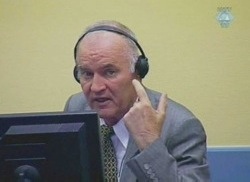
Mladic appeared before the Tribunal because of alleged actions taken in a number of cities in Bosnia-Herzegovina between May 12 and December 31, 1992 that amounted to genocide — a crime punishable by Section 4(3)(1) of the ICTY Statute. He was charged with a separate count of genocide for his alleged role in the infamous massacre at Srebrenica, where 8,000 Bosniak men and boys were murdered. In addition to the two genocide counts against him, Mladic was charged with the persecution of political racial, and religious groups, extermination, murder, deportation, forceable transfer, terrorism, unlawful attacks on civilians, and taking of hostages. These counts, eleven in total, represent violations of the ICTY Statute, crimes against humanity, and violations of the laws of war. Mladic was charged in his personal and superior capacity on all counts.
It is clear that Mladic was highly disruptive at the hearing. Judge Orie began the hearing by admonishing Mladic for his non-verbal communication with members of the audience at his initial appearance a month before. No less than five minutes after the admonition, Mladic could be seen gesturing to the audience, at one point giving the the crowd a smiling thumbs up. Throughout the first part of the hearing, Mladic interrupted Judge Orie several times. Judge Orie warned Mr. Mladic that if Mladic continued his disruptive course, he would be removed from the chambers. As Judge Orie started reading the first genocide count, Mladic interrupted boisterously and was promptly removed from the tribunal.
While there is no question that Mladic was in fact disruptive, an interesting question arises as to the explanation for Mladic’s behavior. Essentially, there are only two possible theories: either Mladic did not understand the nature of the proceedings, or his outrage was simply false. In the end, the legal reality surrounding Mladic’s initial appearance strongly suggests that the latter explanation is the more accurate one.
Mladic’s hearing on July 4 was an “Initial Appearance” under Rule 62 of the ICTY’s Rules of Procedure Evidence (RPE). As such, the sole purpose of this hearing was the formal reading of the charges against the accused and an initial, though non-binding, entry of the accused’s plea. If the accused pleads not guilty, the Registrar sets a date for the trial, and if the accused pleads guilty, the Registrar sets a date for the pre-sentencing hearing. It bears repeating that this initial plea is non-binding and that pleas have been changed before at the ICTY.
Here, Mladic’s principle (and only) complaint against the Tribunal was that his chosen counsel, Milos Saljic of Belgrade and Alexander Mezyaev of Russia, was not present in the chambers. This is an extraneous, if not erroneous, complaint because it is difficult to imagine a scenario in which Mladic would plead guilty to any of the charges levied against him. Moreover, Mladic had already spent considerable time with Saljic, he does not know Mezyaev personally, and he spoke of his desire to “draft a legal strategy,” which seems to imply a not guilty plea. Thus, it appears that cynical legal strategy led to his behavior before the tribunal.
There are two clear tactical advantages to Mladic’s behavior — one failed entirely and the other fell short, both thanks to Judge Orie’s prompt ejection of Mladic. The first strategy is a simple delay tactic. Mladic would be happy to have his proceeding last until the day of his death, and his attorney’s request for an additional month long extension before a plea is entered was a clear manifestation of Mladic’s desire for delay. We can expect more delay tactics of this sort as the proceeding moves forward. In denying Mladic’s request for delay, establishing that Mladic did not wish to enter a plea, and ejecting Mladic for his behavior, Judge Orie ensured that, at least for the time being, Mladic’s case will move forward as planned.
The second tactical decision at play is Mladic’s desire to delegitimize the tribunal before which he sits. This tactic is nothing new, and accused war criminals frequently resort to delegitimization attempts out of a lack of other options. In this instance, Mladic’s attempts were largely unavailing. In fact, apart from a statement that the ICTY is “not a real court,” Mladic was unable to insert any disparaging remarks into the proceedings.
Judge Orie is to be commended for his handling of the situation, which led not only to a speedy administration of justice but also upheld the dignity and decorum of the tribunal in the face of a subject whose lack of self-awareness made him uncooperative to the point of apparent immaturity. The media coverage of the hearing focused on the ejection itself, due in large part towards its “bias in favor of conflict and sensationalism“. In reality, the conflict was dampened at every turn by Judge Orie’s handling of the matter.


